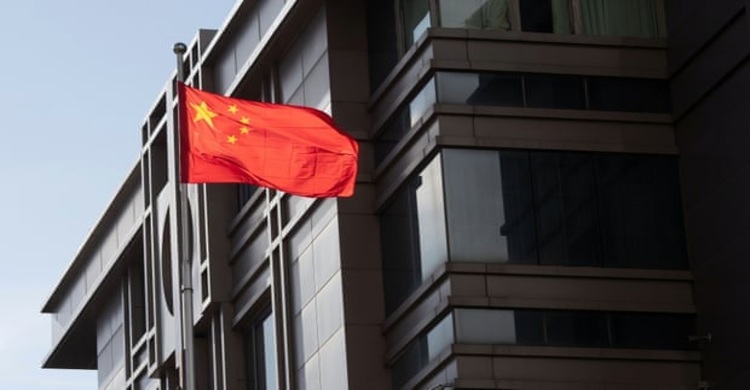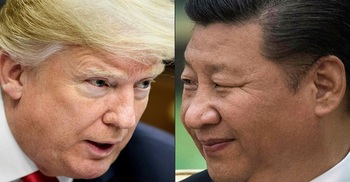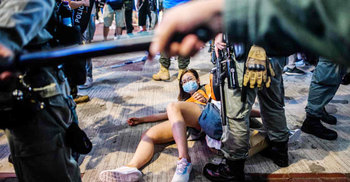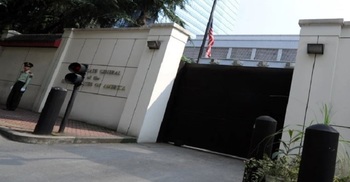China harboring fugitive scientist at US consulate

Tensions between the United States and China have continued to ratchet up following the forced closure by Washington of Beijing's consulate in Houston, amid revelations that federal prosecutors are seeking a Chinese scientist accused of visa fraud who they say is hiding out in China's consulate in San Francisco, reports CNN.
Prosecutors allege Tang Juan, a researcher focusing on biology, lied about her connection to the Chinese military in order to obtain entry into the US and has since avoided arrest by taking refuge in the West Coast diplomatic mission.
According to court filings, Tang was charged on June 26 with one count of visa fraud. Prosecutors said she concealed her connection to the country's military in her visa application, but investigators "discovered photographs of her in the uniform of the Civilian Cadre of the Chinese People's Liberation Army (PLA)" and that she had been employed as a researcher at the Fourth Military Medical University (FMMU).
During an interview with FBI agents on June 20, "Tang denied serving in the Chinese military, claimed she did not know the meaning of the insignia on her uniform, and that wearing a military uniform was required for attendance at FMMU because it was a military school," attorneys wrote in a July 20 court filing.
However, during a search of her residence and electronic media, FBI agents allegedly "found further evidence of Tang's PLA affiliation."
Following her interview with the bureau, Tang allegedly fled to the San Francisco consulate, "where the FBI assesses she has remained."
CNN has reached out to the US State Department, the Justice Department and the FBI for further comment. Separately, CNN has also reached out to China's Ministry of Foreign Affairs.
The criminal complaint names several other Chinese scientists in the US. Prosecutors claim they are part of a "program conducted by the PLA -- and specifically, FMMU or associated institutions -- to send military scientists to the United States on false pretenses with false covers or false statements about their true employment."
"There exists evidence in at least one of these cases of a military scientist copying or stealing information from American institutions at the direction of military superiors in China," prosecutors said.
"There additionally exists evidence of the PRC (People's Republic of China) government instructing these individuals to destroy evidence and in coordinating efforts regarding the departure of these individuals from the United States, particularly following the charges filed against Xin Wang in this district on June 7, 2020."
Last month, Wang was arrested at Los Angeles International Airport, attempting to depart the United States for Tianjin, China, and was charged with visa fraud.
Commenting on Wang's arrest, Chinese Foreign Ministry spokeswoman Hua Chunying called it "blatant political persecution."
"As far as I know, Wang Xin does research in the field of cardiovascular diseases. I don't see how that could ever threaten US national interest or security," she said, adding that "recently many Chinese citizens were questioned for a long time by American law enforcement officials while leaving the US, and the digital devices they carried were also examined."
Houston closure
On Wednesday Beijing promised to retaliate to the Houston closure, with state media pointing to the potential shuttering of one of the US' numerous diplomatic missions within China.
While Washington is still being vague on what prompted the Houston decision, it appears to have some connection to espionage, coming a day after US prosecutors charged two alleged Chinese hackers over a "sweeping global computer intrusion campaign" that they say was supported by the country's government and aimed at coronavirus treatment and vaccine research.
On Twitter, Republican Sen. Marco Rubio of Florida, the acting chair of the Senate Intelligence Committee, said the Houston consulate was a "central node of the Communist Party's vast network of spies." The US State Department earlier accused China of having "engaged for years in massive illegal spying and influence operations" and that those "activities have increased markedly in scale and scope over the past few years."
A State Department spokeswoman said the consulate was directed to close "in order to protect American intellectual property and Americans' private information" but did not immediately provide additional details of what prompted the move.
China's Foreign Ministry called the order an "unprecedented escalation" and suggested it would retaliate in kind. Late Tuesday, officials in Houston could be seen appearing to burn documents in a courtyard outside the consulate.
Speaking to CNN affiliate KTRK, China's consul general in Houston, Cai Wei, said he was shocked by the closure order.
"I never expected (to be) treated like this, and we are coming for friendship, and for mutual understanding between China and the United States," he said.
Potential retaliation
Relations between China and the United States have plummeted in the past year, amid an ongoing trade war, the coronavirus pandemic, and US criticism of China's human rights abuses in Hong Kong and Xinjiang.
US Secretary of State Mike Pompeo, who was just in Europe rallying leaders to take a harder line with Beijing and meeting with exiled Chinese dissidents, said that the move was consistent with the Trump administration's policy towards China.
"President Trump has said 'enough'. We're not going to allow this to continue to happen," Pompeo said. "We are setting out clear expectations for how the Chinese Communist party is going to behave, and when they don't, we're going to take actions that protect the American people, protect our security, our national security, and also protect our economy and jobs."
Pompeo is set to deliver remarks on China on Thursday at the Richard Nixon Museum and Library in California. His speech could announce another escalation against China, particularly if Beijing takes action against a US consulate or other interests in the country ahead of his address.
Analysts expect China to target the US consulate in Wuhan, which has been effectively closed for months due to the coronavirus pandemic. James Green, a senior research fellow at Georgetown University and former US diplomat in China, said that "there would be some symmetry in closing the US consulate in Wuhan."
However, Green was skeptical about the supposed intelligence or espionage capabilities of the Houston consulate.
"The likely real driver is (Pompeo's) speech on Thursday at the Nixon Library on China," he said. "It culminates a month of China speeches by National Security Advisor O'Brien, FBI Director Christopher Wray, and Attorney General Barr. Having something big to announce or explain will give the speech more 'umph'."
Jeff Moon, who served as a US diplomat in China as well as assistant US trade representative for China affairs under President US President Donald Trump, agreed that the Houston consulate was an unlikely target to crack down on IP theft, adding "if that were the real reason, the US would close the San Francisco consulate, which covers Silicon Valley."
Moon said it may be a response to China's refusal to allow US diplomats to return to China without intrusive testing and quarantines that violate the Vienna Convention on diplomatic relations. China currently has strict entry requirements over the coronavirus, but the tests required could expose the DNA of diplomats.
"Chinese consulates in the US are operating without restrictions in the US, so this is a way of gaining leverage in ongoing negotiations and forcing reciprocity on China," he added.
'Dangerous escalation'
Observers were concerned by the continued worsening of relations between the two largest economies, and warned a potential diplomatic spat could quickly escalate.
Guy Saint-Jacques, Canada's former ambassador to China, said the move was a "dangerous escalation."
"Now is the time to maintain official dialogues to clear misunderstandings and press them to change their ways," he added. "The whole idea of decoupling the two economies is troublesome as it could have long-term geopolitical consequences: when you do a lot of business together, you need to work together to avoid problems/irritants from becoming major crises."
Natasha Kassam, a research fellow at the Lowy Institute in Sydney and former Australian diplomat in China, warned that "Beijing may retaliate by reducing numbers of US diplomats overall."
"Such a move would limit Washington's avenues for communications with Beijing, as well as outsiders ability to monitor and report on what is happening inside China," she added. "This decision mirrors the missteps taken by the United States over PRC journalists that ultimately cost a number of US papers some of their best journalists in China."







